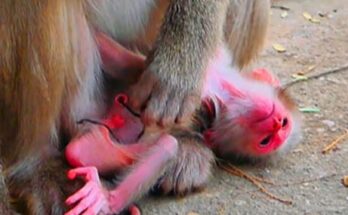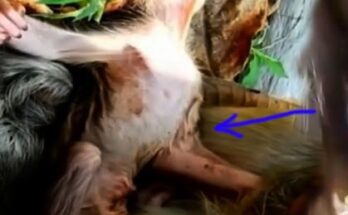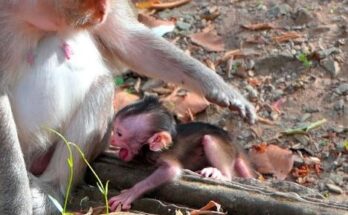In the animal kingdom, few scenes are more heartbreaking than a mother monkey rejecting or abandoning her newborn. Monkeys are generally known for their strong maternal instincts, often forming deep, nurturing bonds with their infants. So when a mother turns away from her tiny, helpless baby, it naturally raises questions—and emotions. Why does this happen? What could possibly drive a mother to reject her own offspring?
There isn’t a single answer. In fact, maternal rejection in monkeys is a complex behavior influenced by a mix of biological, environmental, psychological, and social factors.
1. Health of the Infant
One of the most common reasons a mother monkey might abandon her newborn is if the infant is sick, weak, or deformed. In the wild, survival is brutal. A mother may instinctively recognize that her baby is unlikely to survive, and rather than invest energy in a hopeless situation, she may focus on her own survival or the care of other offspring. While it may seem cruel from a human perspective, it can be a survival strategy shaped by evolution.
2. Inexperience or Stress in First-Time Mothers
Just like humans, monkey mothers vary in experience and temperament. First-time mothers are more prone to anxiety and confusion, and they may not understand how to care for a newborn. High levels of stress—especially in captivity or unstable environments—can also impair maternal behavior. If the mother is overwhelmed, scared, or in poor health herself, she may reject the infant out of fear or inability to cope.
3. Social Hierarchy and Group Dynamics
Monkeys are social animals that live in hierarchical societies. A low-ranking female may face aggression or social stress from other group members, which can impact her ability to care for a baby. Sometimes, the presence of a dominant female or aggressive males can cause a mother to distance herself from her infant out of fear or protection. In extreme cases, social tension may lead her to abandon the baby altogether.
4. Hormonal Imbalances
Maternal behavior in monkeys is heavily influenced by hormones like oxytocin, often called the “bonding hormone.” If a mother experiences hormonal disruptions—due to stress, malnutrition, or birth complications—her ability to bond with and care for her baby can be impaired. Without that natural hormonal “kick,” she may feel indifferent or even hostile toward the newborn.
5. Human Interference or Captivity
In captive settings, mother-infant rejection is reported more frequently than in the wild. Artificial environments, lack of natural social interactions, and human interference during or after birth can disrupt normal bonding. Even well-meaning interventions—like separating the baby briefly for medical checks—can sometimes confuse or distress the mother.
In the end, while it’s easy to humanize animal behavior, nature often operates by different rules. A mother monkey rejecting her newborn may seem tragic, but it’s often driven by deep-rooted instincts aimed at survival and long-term fitness. Understanding these reasons not only helps us empathize with the complexity of animal behavior but also informs how we care for and support primates in the wild and in captivity.


